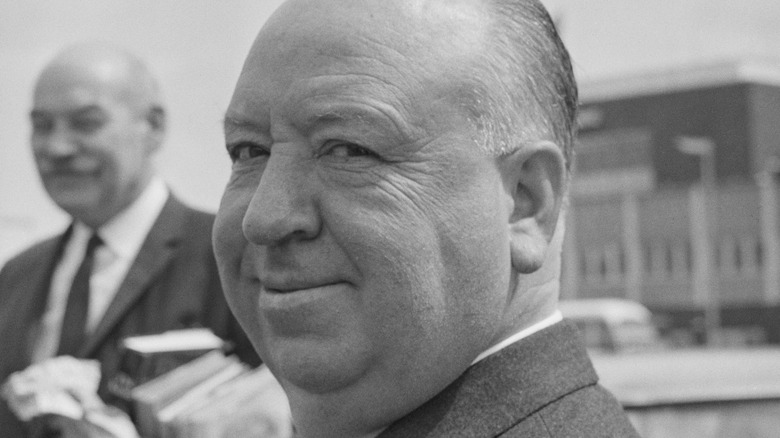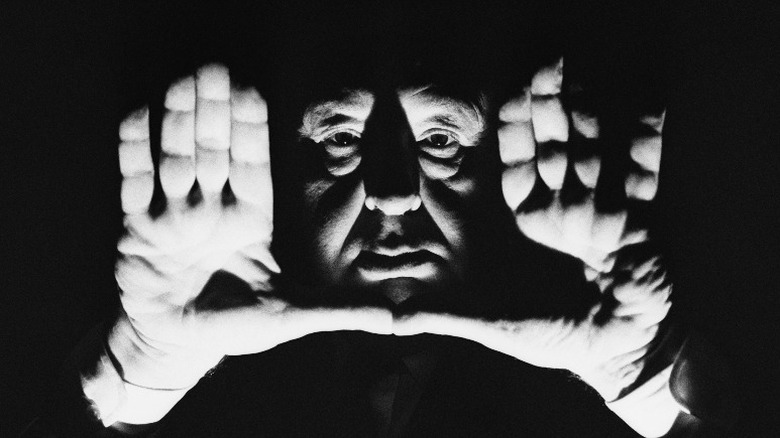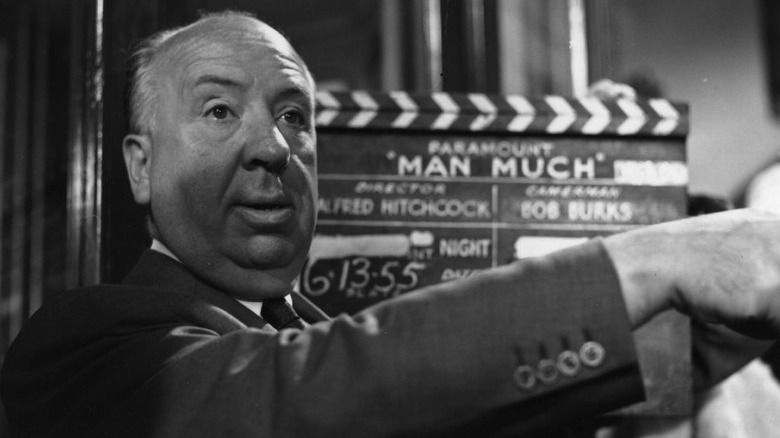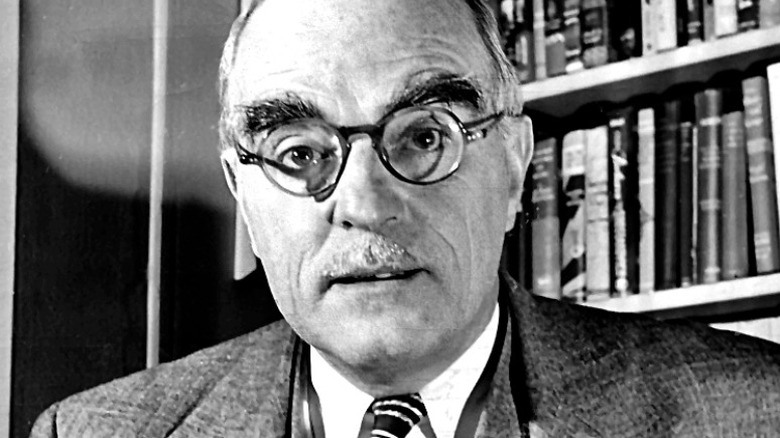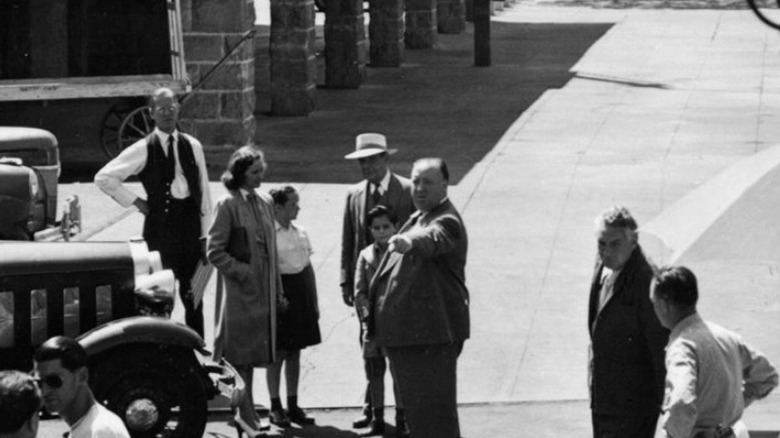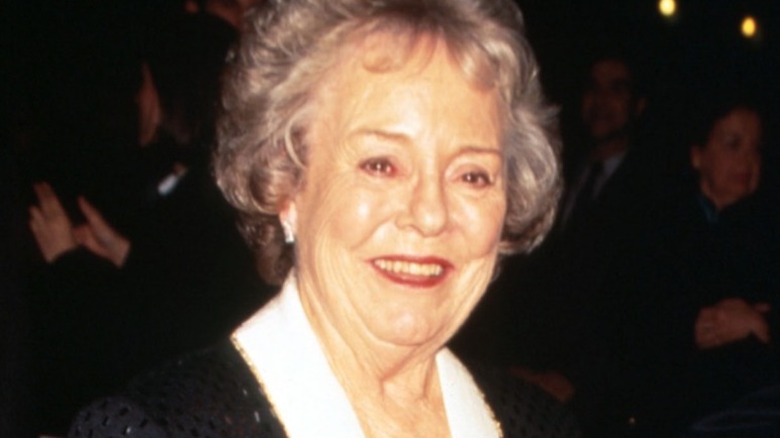This Lesser-Known Alfred Hitchcock Film Was Actually The Director's Favorite
The sheer volume of work that famed director and producer Alfred Hitchcock amassed over his 60-plus years in the film industry was rivaled by a few of his contemporaries. Beginning with silent-era classics that include "Blackmail" and "The Lodger," the legendary British filmmaker leaped into talking pictures without missing a beat. With suspense as his foray, Hitchcock shocked and dazzled audiences with solid releases as sound ushered in this new era. "The Lady Vanishes," "The 39 Steps," and the original film, "The Man Who Knew Too Much," helped to make a name for himself in his native England, but also made him in demand across the pond.
From the 1940 film, "Rebecca," until his last movie, "Family Plot," in 1976, Hitchcock mainly worked with U.S. motion picture studios (via IMDB). While in the states, he worked with many stars including Jimmy Stewart, Carey Grant, James Mason, Grace Kelly, and many more.
The answer might surprise many of his fans when asked what his favorite film was to direct. After all, one might believe that a classic like "Psycho" or "North by Northwest" would get a nod from the director, as they helped him secure his reputation as one of the greatest directors of the era. But Hitchcock revealed that his favorite film to direct was one that many fans might not have viewed. This is because he produced the film early in his days at Universal Pictures, long before working with stars like Stewart or Grant.
Hitchcock revealed that his favorite film was Shadow of a Doubt
The film that Hitchcock loved directing the most was the 1943 suspense thiller, "Shadow of a Doubt" (via Brattle Film). The plot revolves around a family in a small California in which the brother of the family's matriarch pays a visit. Joseph Cotton plays Charlie Oakley, whom you can sense has a close bond with both his sister and his nieces but he is also hiding a terrible secret.
Throughout the film, it is revealed that dear Uncle Charlie is committing dastardly acts on unsuspecting women. His niece, Charlotte (shortened to "Charlie" as she is the namesake of her much-beloved uncle), discovers that her relative is the notorious "Merry Widow Killer," a predator who stalks, strangles, and robs women.
Though his arrival at their home is much welcomed, it is soon overshadowed by the appearance of two detectives. One of the men takes Charlotte on a date and informs her that Uncle Charlie is one of the two prime suspects in the murders. This prompts her to pay closer attention to her uncle and scrutinize his behavior. At one point, she witnesses him ripping an article out of the local newspaper, leading her to find the article in the local library. The article was a story on the murders (via The Thorton Wilder Society).
The suspense continues to build in the film as Uncle Charlie begins to have suspicions of his own, adding to the intensity.
Shadow of a Doubt is a suspense classic
At one point in the film, Uncle Charlie is grousing about the "uselessness" of widows, which Charlotte countered with an argument stating that they are human beings. Aggravated by her opposition, he says "Are they? Are they Charlie? Are they human or are they fat, wheezing, animals? The world's a hell...what does it matter what happens in it ... " (per The Thorton Wilder Society).
After this exchange, Charlie begins to realize that her uncle very well could be the killer. She agrees to assist the detectives so that he can be brought to justice. But her sudden change in attitude toward her uncle does not go unnoticed. Uncle Charlie suspects that his niece is on to his horrifying secret. He launches a murderous plot to eliminate his flesh and blood so he can evade capture. Though Cotton's character entered "Shadow of a Doubt" as a highly revered family figure, he quickly devolves into a sinister fiend, hell-bent on ending the life of his niece.
The strong storyline could be argued as a reason why Hitchcock listed this film as the favorite of his directorial career. But when compared to the suspense and terror that many of his other films produced, it's safe to say that it wasn't the storyline alone that made "Shadow of a Doubt" arrive at the top of Hitchcock's list. Rather there were some great sentimental reasons added to the foray that prompted the famed director's response to the question.
Hitchcock's wife helped write the screenplay for the film
Years after the film was released, Hitchcock's only child (daughter Pat Hitchcock) revealed, "[T]his was my father's favorite movie because he loved the thought of bringing menace into a small town ... " (per Brattle Film). Her words were captured during an interview for the 2000 documentary "Beyond Doubt: The Making of Hitchcock's Favorite Film." In it, Pat relays other reasons why "Shadow of a Doubt" resonated so well with her father.
She tells of how her father worked with acclaimed writer Thorton Wilder on the screenplay, adding his personal touches to the script. Hitchcock chose Wilder to work on the film in part because he was from the United States. Though several previous films from the director were U.S. productions, "Shadow of a Doubt" was the first of Hitchcock's movies to take place in the states.
The documentary also tells of how Hitchcock couldn't think of a better person to write the tale of happenings in a small town since Wilder penned the quintessential play about the American small town with "Our Town." Hitchcock also appreciated how the lead screenwriter came into the production without an ego, making working with him a dream. He respected Wilder so much that he gave the writer a special credit of acknowledgment at the beginning of the film's opening credits.
In addition, Hitchcock enlisted the help of someone whose thoughts and creative opinions he highly revered: His wife, Alma. She, along with Sally Benson, helped to write the movie's screenplay (via "Beyond Doubt: The Making of Hitchcock's Favorite Film").
Scouting locations for the film introduced Hitchcock to a side of America he hadn't seen
"Shadow of a Doubt" sent Hitchcock to various towns in California, seeking the perfect spot for his first U.S.-based story. Associate Director Robert Boyles said that when Hitchcock visited Santa Rosa, Calif. (located in Napa Valley), he saw how it was a "sleepy little village" at the time, according to Boyle. It was the kind of town that wasn't marked by any particular region of the country. It was one that embodied everything about small-town American life without being identifiable (per "Beyond Doubt: The Making of Hitchcock's Favorite Film"). There, Hitchcock found the perfect house for the one that appeared in the film.
Also adding to Hitchcock's joys surrounding the film was the cast that he worked with. The villain and co-star Joseph Cotton was a close friend of Hitchcock's according to his daughter. Pat also claimed to have had a hand in the production, helping to coach the younger cast members that were on the set.
Though Hitchcock would later work with film legends, bigger budgets, and more elaborate sets, watching "Shadow of a Doubt" for the first time might well surprise you as to why this film great has been eclipsed by the other films in Hitchcock's seemingly endless film catalog.
Shadow of a Doubt was also a favorite of his daughter, Pat
"Shadow of a Doubt" was also one of Pat Hitchcock's favorite films attributed to her father. During her interview in "Beyond Doubt: The Making of Hitchcock's Favorite Film," she revealed that the movie was among her top Hitchcock films in part due to how it was cast.
Theresa Wright, who played Charlotte in the film, discusses how Hitchcock was able to lure in audiences with his unique way of captivating and holding their attention. According to the actress, she was "mesmerized" by the script, and that when she, at last, saw the final cut of the film she remarked that she had already seen the film, as the writing was so remarkable that Hitchcock's vision of it was already in her mind before the cameras were ever rolling.
While "Shadow of a Doubt" is one of the earlier films of his career, it is arguably one of the most suspenseful from Hitchcock's imagination.
